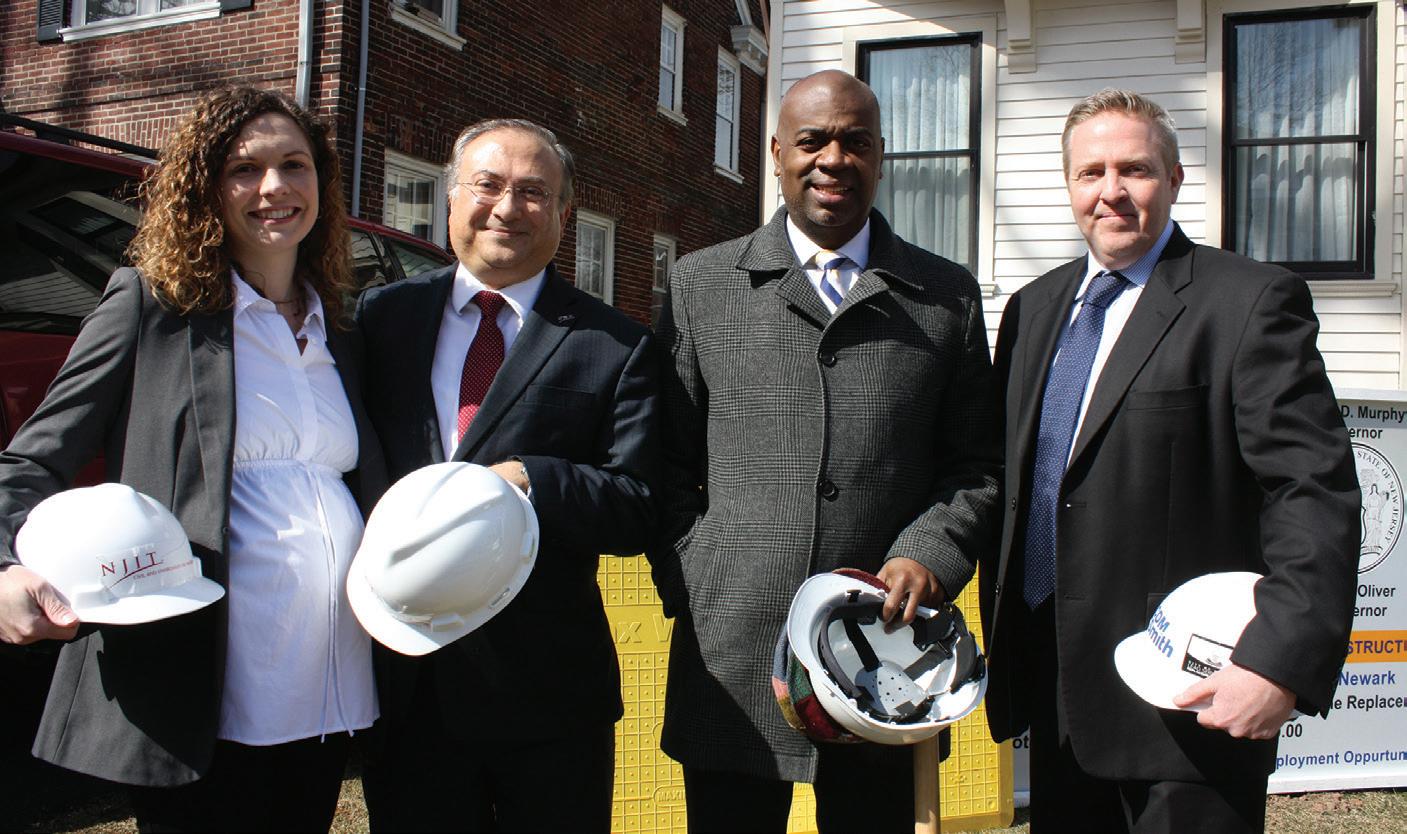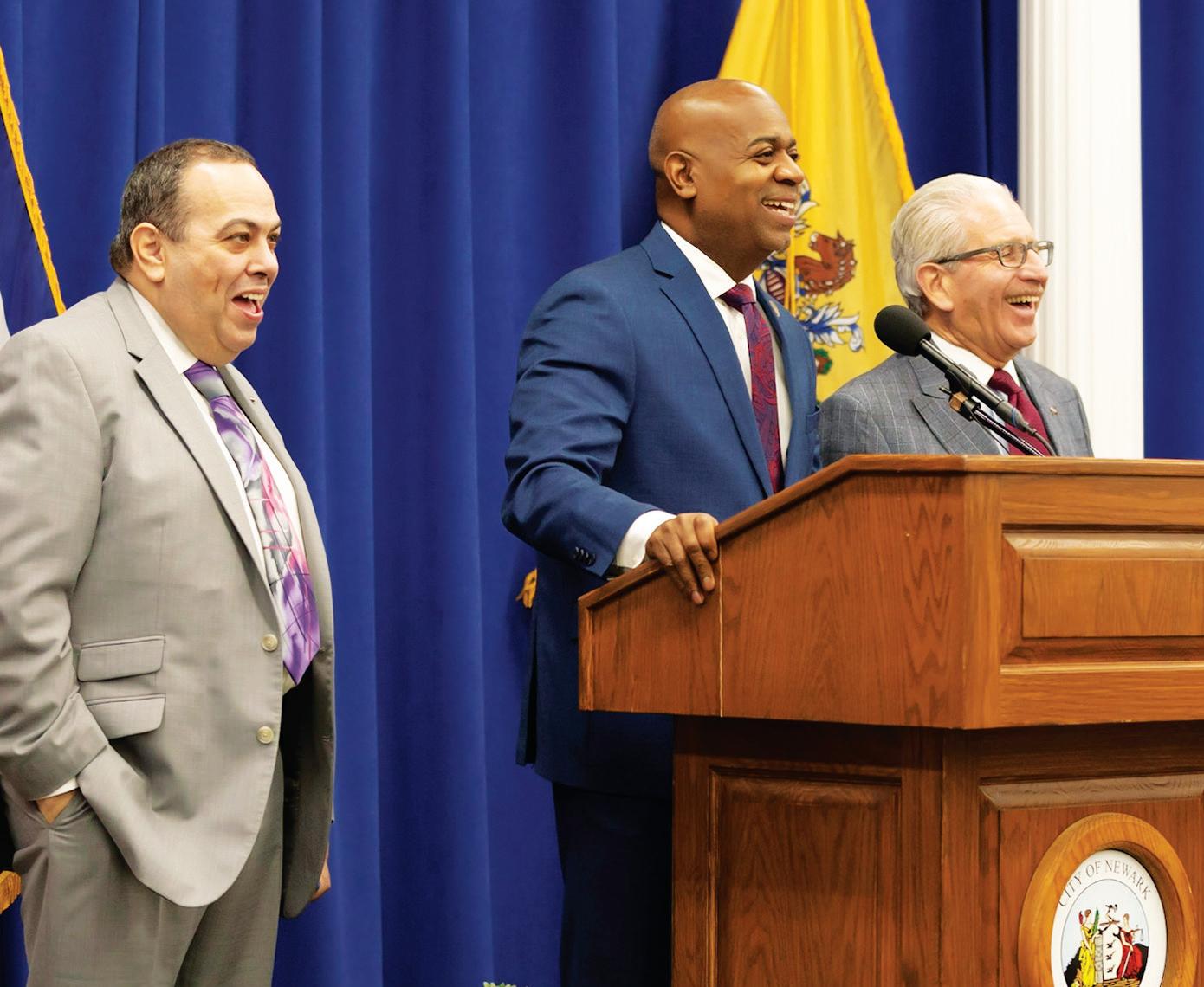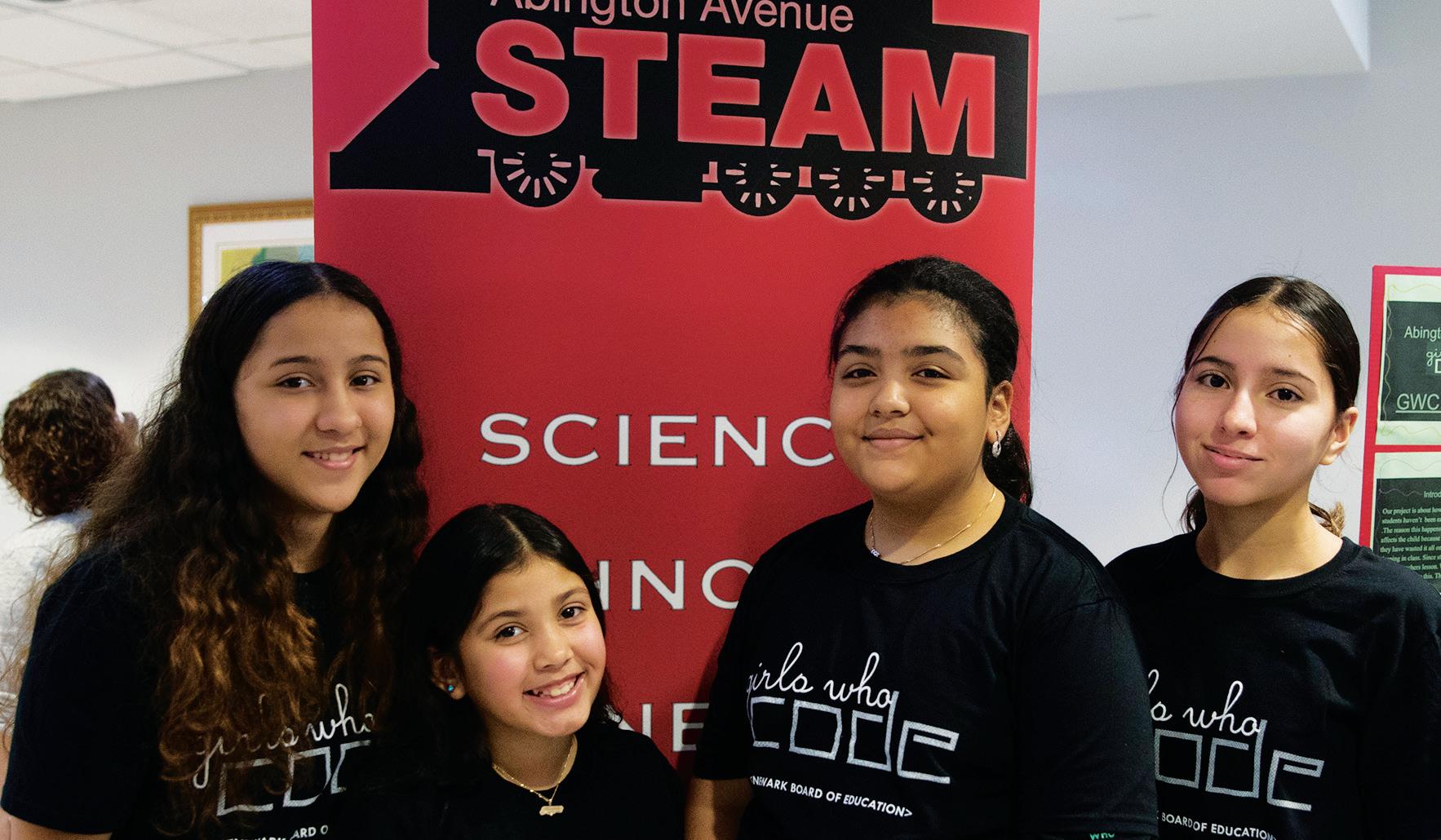
6 minute read
Leading into the Future: Community
Getting the Lead out of Newark’s Drinking Water
As Newark races to replace thousands of lead-based pipes that feed drinking water into homes, the city faces another urgent challenge: stopping the heavy metal from leaching into the water supply while the massive remediation effort is underway.
And that’s where NJIT’s environmental engineers come in. To mitigate exposure over the life of the project, which is expected to take up to 30 months, a research team is working with the city to develop and test chemical methods to prevent leadshedding corrosion in as many as 18,000 service lines that stretch from the water main located under streets into dwellings.
Lead in pipes can become soluble and transportable if oxidized by flowing water, particularly in aging infrastructure that dates back to the middle of the 20th century and earlier in some cities, including Newark. For 25 years, corrosion prevention in the city’s largest service area, which draws water from reservoirs in the Pequannock River system, consisted of injecting a chemical, silicate, into the water supply. It formed a protective layer of material over the interior surface of the pipe to prevent lead from mobilizing. But testing determined that silicate was no longer effective.
Using X-ray diffraction analysis, the NJIT team assessed the composition of the corrosion in a service line and found that in addition to elemental lead, lead oxides were the compounds most present in the pipe scales. Scanning electron microscopy revealed iron, aluminum, silicon, magnesium and calcium deposits.
With a team of graduate students, Lucia Rodriguez-Freire, assistant professor of environmental engineering, launched a study this past summer of excavated service lines to determine the effectiveness of a new corrosion-control chemical with an
(From left): Lucia Rodriguez-Freire, assistant professor of environmental engineering; Taha Marhaba, chairman of NJIT’s Department of Civil and Environmental Engineering; Newark Mayor Ras Baraka; and David Smith of CDM Smith.
affinity for metal surfaces, orthophosphate, which was introduced into the water system last May. While widely used as a corrosion inhibitor in other water systems, where it has successfully stabilized lead, its introduction is not in and of itself an optimal solution, the researchers say.
Taking into account factors such as chemicals in the water, seasonal temperatures and weather conditions that increase runoff, the team will pinpoint the best treatment strategies as water conditions change, monitoring, for example, how pH and temperature affect leadleaching kinetics under variable doses of orthophosphate in water.
The team is setting up a lab on campus to continue testing for the presence of lead in excavated pipes and to determine how well orthophosphate is building up in the service lines to block corrosion, an electrochemical process. Team members, including engineering graduate students Boran Wang and Maedeh Soleimanifar, traveled last fall for training at the EPA’s Office for Research and Development in Cincinnati, which is currently the only lab in the country to perform these tests.
The engineers also will determine whether the chemicals should be injected at different points in the distribution system other than at the water treatment plant. n

NJIT Students Come Together to Collect Water for Newark Community
Spurred through competition among student organizations, NJIT’s student senate started a water collection competition for the Newark community and challenged each other to try and collect the most bottled water.
In total, roughly 300 cases of water were collected throughout the competition over the course of several weeks. The Coptic Society collected the most, earning their club the $1,000 prize that is added to their budget. The student senate calculated that over 1,000 gallons of water were donated through the NJIT community. n
NJIT, Newark Mayor’s Office and Public Schools Announce Two New Initiatives to Grow STEM Pipeline
Volunteerism is a mainstay at NJIT, with students and faculty engaged in a range of initiatives to better the community. In building upon its close relationship with the city in which it resides, NJIT is partnering
At the news conference (from left): Newark Public Schools Superintendent Roger Leon; Newark Mayor Ras J. Baraka; and NJIT President Joel S. Bloom.
with the City of Newark and the Newark Public Schools on two new initiatives. The Mayor’s Honors Scholars Program at NJIT will create a pipeline from the Newark Public Schools to NJIT’s topranked Albert Dorman Honors College (ADHC). Each year, NJIT will work with the Newark Public Schools to select three Mayor’s Honors Scholars for admissionto ADHC. These students will receive full scholarships, as well as paid internships with the City of Newark during the summer months.
Additionally, the NJIT/Newark Math Success Initiative (MSI) will seek to dramatically increase, to a minimum of 600, the number of Newark residents who enroll at NJIT for undergraduate education. Administered on the NJIT campus, and beginning summer 2019 and continuing throughout the academic year, MSI will provide direct mathematics instruction and support to rising 12th-graders and mathematics-certified teachers from Central, Science Park, Technology and Malcolm X. Shabazz High Schools. The program, which will also offer counseling, tutoring and other college preparatory services to students, and mentoring, professional development and research activities to teachers, is designed to strengthen Newark high school students’ mathematics knowledge, skills and preparation for college work, so they are able to succeed as first-semester, first-year college freshmen taking MATH 111 Calculus at NJIT. Newark Public Schools will identify participating students and teachers. n


Newark’s Girls Who Code Shine during City’s Inaugural Showcase at NJIT
On December 12, 2019, a wave of enthusiasm for all-things code swept through NJIT, as nearly 350 girls from Newark Public School’s grades six-10 arrived on campus to take part in the city’s first-ever “Newark Public Schools Girls Who Code Showcase.” Highlighting the showcase were 26 of the city’s afterschool Girls Who Code clubs that each had the chance to present innovative coding-based projects they have worked on this year to a full crowd of judges and onlookers, all in the spirit of friendly competition.
The inaugural event, held during celebration of Computer Science Education Week’s official “Hour of Code,” also invited keynote addresses at the Campus Center Ballroom from NJIT President Joel S. Bloom and New Jersey Assemblywomen Shavonda Sumter and Britnee Timberlake, as well as a welcome message from First Lady of New Jersey Tammy Murphy.
In a science-fair-style layout across the Campus Center’s second floor, girls of each Girls Who Code club held demos and were excited to talk with judges and event-goers about their projects, which were designed to solve problems in their local community. Their projects ranged from safe-space websites for students to connect with each other and share information about bullying and domestic issues, to technology education apps for the elderly, to video games designed to get kids into urban farming.
Oliver Street School won the grand prize for their web project, “Sustain‘able,” dedicated to promoting sustainable clothing — offering everything from facts related to the environmental impact of the “fast fashion” industry to recommendations on where to shop for fashion- and eco-conscious users. n
(From left): Abington Avenue School’s Yanielis Labrador, Juliana Martinez, Aime Mota and Mariela Echevarria.






